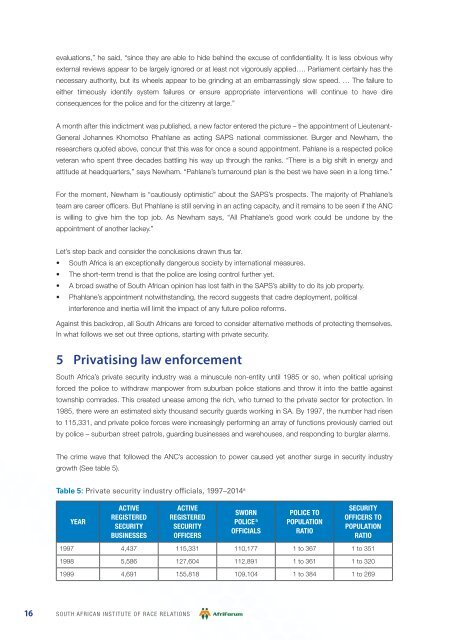2230_SAIRR_WWACinSA_sm4.indd 1 2016/09/05 5:04 PM
sairr_english_wwacinsa_print_050916
sairr_english_wwacinsa_print_050916
You also want an ePaper? Increase the reach of your titles
YUMPU automatically turns print PDFs into web optimized ePapers that Google loves.
evaluations,” he said, “since they are able to hide behind the excuse of confi dentiality. It is less obvious why<br />
external reviews appear to be largely ignored or at least not vigorously applied…. Parliament certainly has the<br />
necessary authority, but its wheels appear to be grinding at an embarrassingly slow speed. … The failure to<br />
either timeously identify system failures or ensure appropriate interventions will continue to have dire<br />
consequences for the police and for the citizenry at large.”<br />
A month after this indictment was published, a new factor entered the picture – the appointment of Lieutenant-<br />
General Johannes Khomotso Phahlane as acting SAPS national commissioner. Burger and Newham, the<br />
researchers quoted above, concur that this was for once a sound appointment. Pahlane is a respected police<br />
veteran who spent three decades battling his way up through the ranks. “There is a big shift in energy and<br />
attitude at headquarters,” says Newham. “Pahlane’s turnaround plan is the best we have seen in a long time.”<br />
For the moment, Newham is “cautiously optimistic” about the SAPS’s prospects. The majority of Phahlane’s<br />
team are career offi cers. But Phahlane is still serving in an acting capacity, and it remains to be seen if the ANC<br />
is willing to give him the top job. As Newham says, “All Phahlane’s good work could be undone by the<br />
appointment of another lackey.”<br />
Let’s step back and consider the conclusions drawn thus far.<br />
• South Africa is an exceptionally dangerous society by international measures.<br />
• The short-term trend is that the police are losing control further yet.<br />
• A broad swathe of South African opinion has lost faith in the SAPS’s ability to do its job property.<br />
• Phahlane’s appointment notwithstanding, the record suggests that cadre deployment, political<br />
interference and inertia will limit the impact of any future police reforms.<br />
Against this backdrop, all South Africans are forced to consider alternative methods of protecting themselves.<br />
In what follows we set out three options, starting with private security.<br />
5 Privatising law enforcement<br />
South Africa’s private security industry was a minuscule non-entity until 1985 or so, when political uprising<br />
forced the police to withdraw manpower from suburban police stations and throw it into the battle against<br />
township comrades. This created unease among the rich, who turned to the private sector for protection. In<br />
1985, there were an estimated sixty thousand security guards working in SA. By 1997, the number had risen<br />
to 115,331, and private police forces were increasingly performing an array of functions previously carried out<br />
by police – suburban street patrols, guarding businesses and warehouses, and responding to burglar alarms.<br />
The crime wave that followed the ANC’s accession to power caused yet another surge in security industry<br />
growth (See table 5).<br />
Table 5: Private security industry officials, 1997–2014 a<br />
YEAR<br />
ACTIVE<br />
REGISTERED<br />
SECURITY<br />
BUSINESSES<br />
ACTIVE<br />
REGISTERED<br />
SECURITY<br />
OFFICERS<br />
SWORN<br />
POLICE b<br />
OFFICIALS<br />
POLICE TO<br />
POPULATION<br />
RATIO<br />
SECURITY<br />
OFFICERS TO<br />
POPULATION<br />
RATIO<br />
1997 4,437 115,331 110,177 1 to 367 1 to 351<br />
1998 5,586 127,6<strong>04</strong> 112,891 1 to 361 1 to 320<br />
1999 4,691 155,818 1<strong>09</strong>,1<strong>04</strong> 1 to 384 1 to 269<br />
16<br />
SOUTH AFRICAN INSTITUTE OF RACE RELATIONS<br />
<strong>2230</strong>_<strong>SAIRR</strong>_<strong>WWACinSA</strong>_<strong>sm4.indd</strong> 16<br />
<strong>2016</strong>/<strong>09</strong>/<strong>05</strong> 5:<strong>04</strong> <strong>PM</strong>


